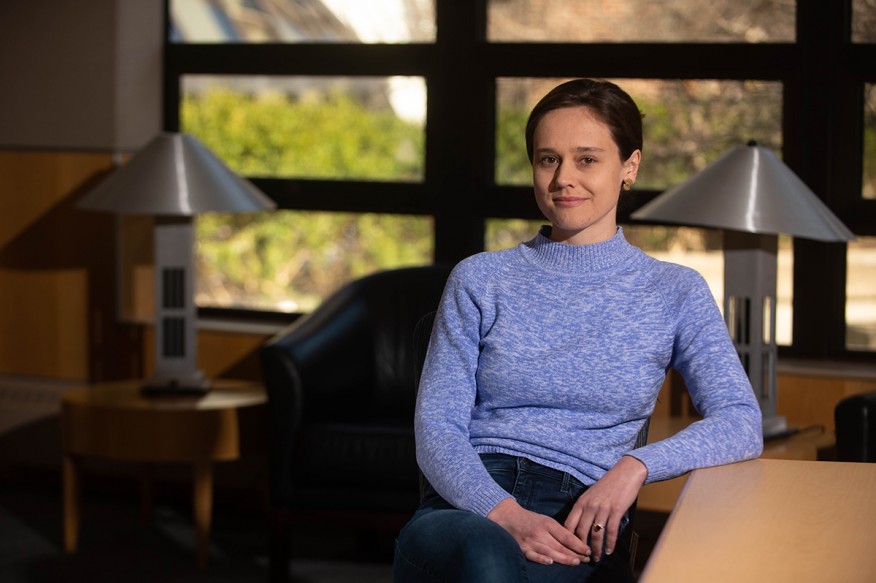-
Pathway:Community Change
People said, “Oh, you're changing careers?” I said, “I’m expanding – bringing everything I already have into the next phase of my life.”
When Sarah Hebert-Johnson was seven, she wanted to go to theater camp, but she was too young. Her mother, with no particular experience in the performing arts, simply built a theater in their backyard in Lexington, Massachusetts. “We hung bedsheets on a clothesline for a curtain,” says Hebert-Johnson. “A friend who played the violin was our one-man orchestra. We called it Backyard Youth Theatre. Shows were written by youth, for youth. We built community, a coalition around each show.”
In college, Hebert-Johnson discovered Augusto Boal, the Brazilian theatre maker, political activist, and author of Theatre of the Oppressed. “I learned from Boal that the arts could advance social and economic change, and I realized how much I had missed devising theatre in community.”
I have learned so much – from the devastating impact of mass incarceration on individuals and society to the benefits of the social work lens in less traditional spaces like prisons.
Hebert-Johnson finished her BFA but balked at following her classmates to more exclusive spaces in New York or LA. Instead, she took off for Mozambique. A friend had an economic development organization there and was supporting a local artist who used Boal’s methods. “I saw them embodying ideas about oppression and change,” she says. “I got to practice for myself the theater games and exercises I had read about, uncovering patterns of social oppression and then testing alternative scenarios.”
An internship in Rio de Janeiro followed, where Hebert-Johnson learned from artists who had worked directly with Boal. “I got to see how the work impacted communities,” she says “This led me toward social work and toward advancing social justice.” She later co-facilitated an outreach program in Boston’s Latin Quarter, in Jamaica Plain. The program used theater arts to help immigrant youth explore issues like gentrification and the complexities of displacement. “Social work just kept popping up!” Hebert-Johsnon says.
To further her education, she weighed MSW programs against programs that combined an MSW and master of fine arts. “The arts were important to me,” she says, “but I really lacked foundational knowledge in human behavior and how racism and poverty affect individuals, families, and communities. I wanted to learn about participatory research and evaluating community programs. An MSW would expand my tool kit, so that’s what I decided to do.”
When she visited our school in the fall of 2021, Hebert-Johnson learned of Professor Rogério Pinto's installation performance, Realm of the Dead, which drew on Augusto Boal’s work to explore injustices and struggles around a tragic event in Pinto’s family. “I look for art that comes directly from individuals and communities as a form of self-healing or to advance social justice,” says Hebert-Johnson. “Learning about Realm made me feel like this was where I should be.”
Hebert-Johnson’s field education was with U-M’s Prison Creative Arts Project. “It has been a wonderful experience working with formerly incarcerated artists,” she says, “meeting them on the arts level and gaining new skills in social work, and specifically working with their Linkage Community, a collective of formerly incarcerated artists. I have learned so much – from the devastating impact of mass incarceration on individuals and society to the benefits of the social work lens in less traditional spaces like prisons.”
Looking to the future, Hebert-Johnson asks, “How do I articulate to arts professionals that the social work lens can be helpful to them?” she asks. “There is a movement now toward making theater more localized. That’s one answer. And there is a movement to create anti-racist theater. There are many resources for this here at U-M. I am pursuing a diversity, equity, and inclusion certificate at Rackham Graduate School. My definition of social work has become so expansive.
“I love being in a space where people are imagining, creating, thinking, and diving in. What does a socially just society look like? What does a socially just school of social work look like? I am having those conversations, and challenging others not only to talk about the change we want to be but to embody the just futures we long for. That's exactly where I want to be.”
